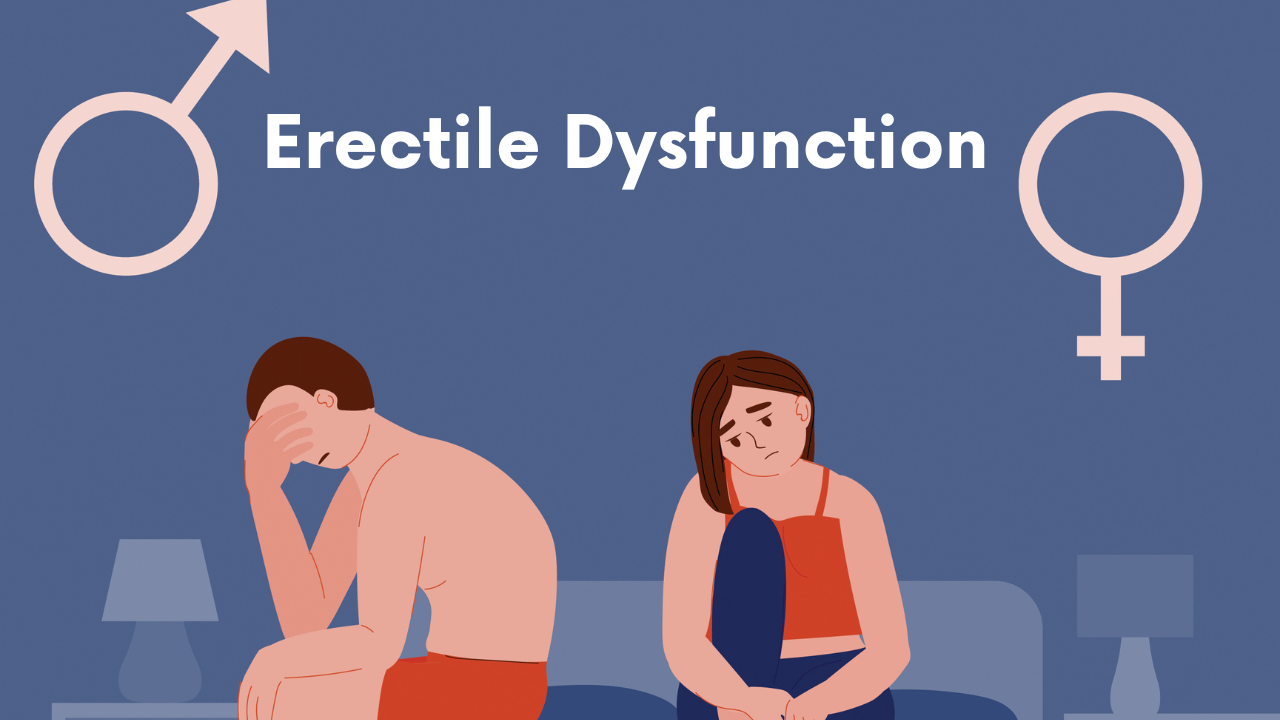Dr. Patil's Diabetes, Thyroid & Hormone Clinic | Dr. Himanshu Patil
Impotence and sexual dysfunction

Impotence, also known as erectile dysfunction (ED), is the inability to achieve or maintain an erection sufficient for sexual intercourse. It is a common condition that can affect men of all ages, though it becomes more prevalent with age. Sexual dysfunction, in general, refers to difficulties related to any stage of the sexual response cycle, including desire, arousal, orgasm, and satisfaction, and it can affect both men and women.
Causes of Erectile Dysfunction
- Difficulty achieving or maintaining an erection
- Reduced sexual desire (low libido)
- Premature ejaculation or inability to ejaculate
- Difficulty enjoying sexual intercourse due to anxiety or stress
Symptoms of Erectile Dysfunction
Physical Causes:
- Cardiovascular Issues: Conditions such as high blood pressure, heart disease, and clogged arteries (atherosclerosis) can restrict blood flow to the penis, leading to difficulty getting or maintaining an erection.
- Diabetes: High blood sugar levels can damage nerves and blood vessels, affecting sexual function.
- Obesity: Being overweight can increase the risk of conditions like heart disease and diabetes, which contribute to ED.
- Hormonal Imbalances: Low levels of testosterone, thyroid disorders, or other hormonal conditions can lead to erectile dysfunction.
- Neurological Disorders: Conditions like Parkinson’s disease, multiple sclerosis, or spinal cord injuries can disrupt nerve signals necessary for an erection.
- Medication Side Effects: Some medications, particularly for high blood pressure, depression, or anxiety, can cause erectile dysfunction as a side effect.
Psychological Causes:
- Stress and Anxiety: Performance anxiety or work and life stress can interfere with sexual function.
- Depression: Depression can lead to a loss of libido (sexual desire) and contribute to ED.
- Relationship Issues: Communication problems, unresolved conflicts, or lack of intimacy with a partner can lead to or exacerbate erectile dysfunction.
Lifestyle Factors:
- Smoking: Smoking damages blood vessels, reducing blood flow to the penis.
- Alcohol and Drug Use: Excessive alcohol or recreational drugs can affect nerve function and interfere with sexual performance.
- Lack of Exercise: Physical inactivity can lead to poor circulation and weight gain, which increases the risk of erectile dysfunction.
Types of Sexual Dysfunction
In Men:
- Erectile Dysfunction (ED): As discussed above, it refers to the inability to maintain an erection.
- Premature Ejaculation: A condition where a man ejaculates too early during sexual activity, leading to dissatisfaction for both partners.
- Delayed Ejaculation: Difficulty in ejaculating despite adequate sexual arousal and stimulation.
- Low Libido: A reduced or lack of interest in sexual activity, which may be caused by psychological or physical factors.
In Women:
- Female Sexual Interest/Arousal Disorder: A lack of desire or arousal during sexual activity, often due to hormonal changes (such as menopause), stress, relationship issues, or depression.
- Dyspareunia: Painful intercourse, often caused by vaginal dryness, hormonal imbalances, or underlying medical conditions.
- Anorgasmia: The inability to reach orgasm despite adequate sexual stimulation.
- Vaginismus: A condition where involuntary muscle spasms make vaginal penetration painful or impossible.
Treatment for Impotence and Sexual Dysfunction
For Erectile Dysfunction:
- Lifestyle Changes: Regular exercise, quitting smoking, and reducing alcohol intake can help improve erectile function.
- Medications: Oral medications like sildenafil (Viagra), tadalafil (Cialis), or vardenafil (Levitra) increase blood flow to the penis.
- Hormone Therapy: Testosterone replacement may be prescribed if low testosterone is the cause.
- Psychological Therapy: Counseling or therapy (such as cognitive behavioral therapy) can address anxiety, depression, or relationship issues contributing to ED.
- Vacuum Devices: A mechanical device that helps draw blood into the penis to create an erection.
- Surgery: Penile implants or vascular surgery may be an option in severe cases.
For Sexual Dysfunction:
- Hormonal Therapy: For both men and women, hormone replacement or balancing can treat hormonal imbalances that contribute to sexual dysfunction.
- Psychological Counseling: Therapy to address stress, anxiety, past trauma, and relationship issues is often effective in improving sexual function.
- Medications for Low Libido: For women, medications like flibanserin (Addyi) or bremelanotide (Vyleesi) may be used to treat low sexual desire.
- Pain Management: For women experiencing painful intercourse, treatments may include vaginal lubricants, estrogen creams, or pelvic physical therapy.
- Couples Therapy: Working with a therapist to improve communication, intimacy, and trust in relationships can help resolve sexual dysfunction.
Causes of Sexual Dysfunction
Physical Causes:
- Hormonal imbalances (testosterone, estrogen, progesterone)
- Chronic illnesses (diabetes, heart disease, high blood pressure)
- Neurological conditions (nerve damage, multiple sclerosis)
- Medications (antidepressants, blood pressure medications, etc.)
- Painful conditions (vaginismus, erectile dysfunction)
Psychological Causes:
- Stress: Anxiety or worry about performance, relationship dynamics, or work pressures can interfere with sexual function.
- Depression: Low mood can reduce libido and interfere with sexual enjoyment.
- Trauma or Abuse: Past sexual trauma or abuse may result in emotional and psychological challenges related to intimacy.
- Relationship Issues: Problems with communication, trust, or emotional connection with a partner can affect sexual desire and satisfaction.
Lifestyle Factors:
- Substance Use: Smoking, excessive alcohol consumption, and drug use can interfere with sexual function.
- Lack of Physical Activity: Poor circulation, obesity, and lack of exercise can contribute to sexual dysfunction.
